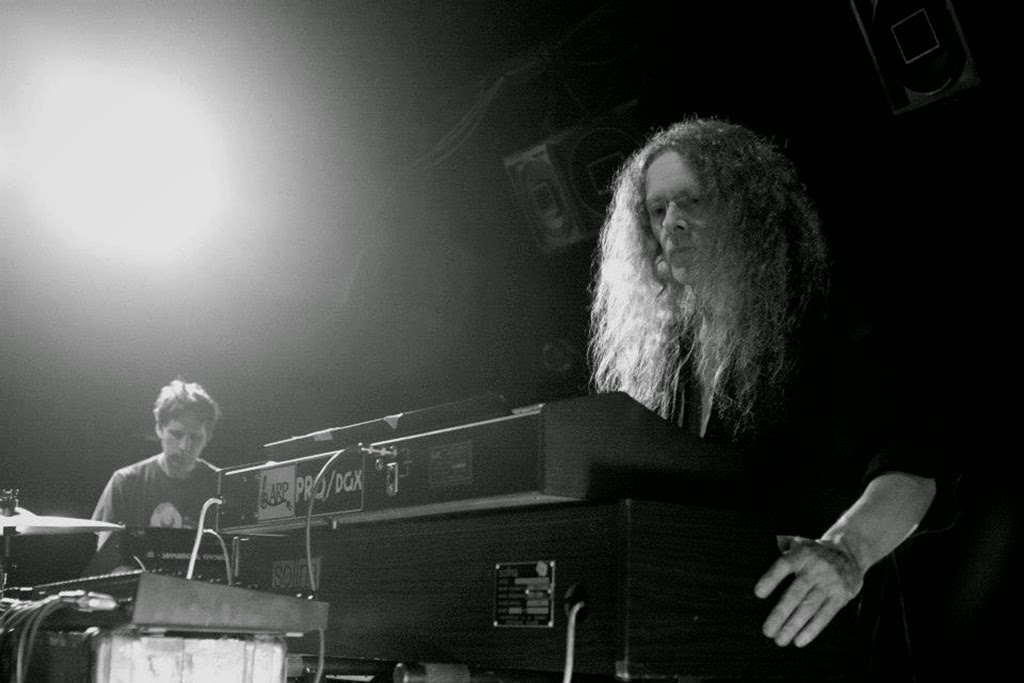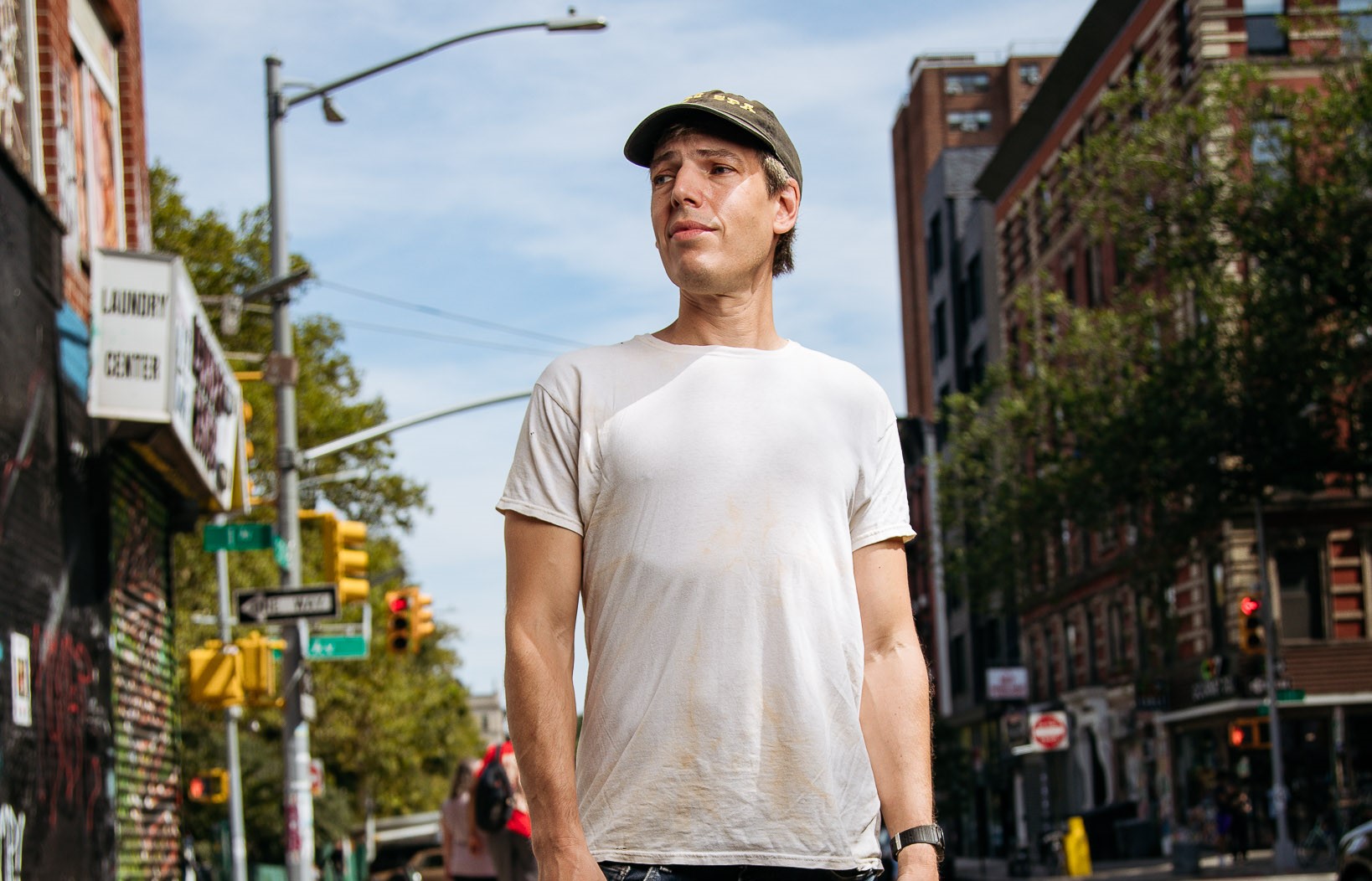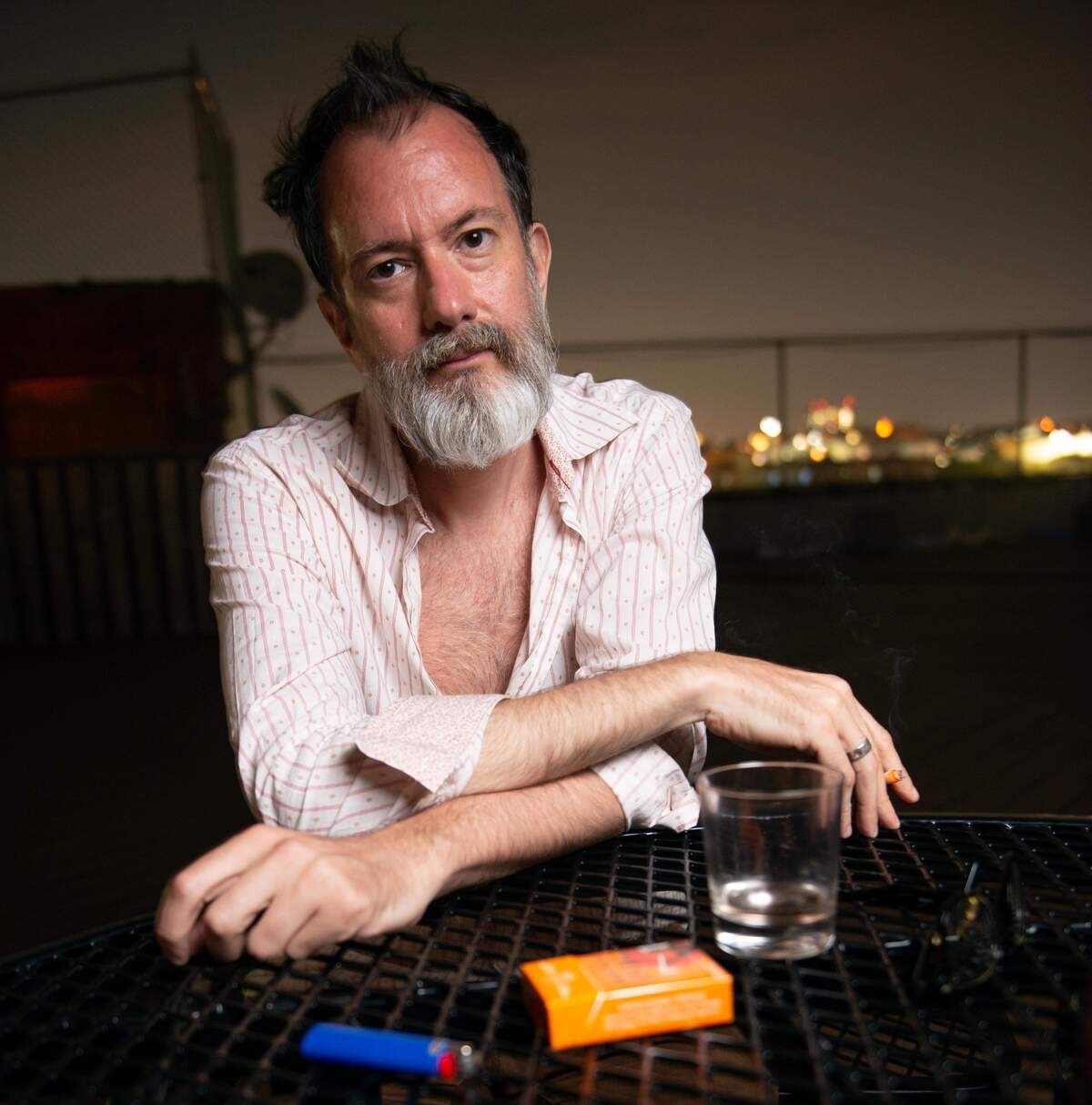Zoltan | Interview | Matt Thompson
While there may be a lot of bands that are trying to do the ‘horror soundtrack’ thing these days, Zoltan are one of the few bands that I’ve heard which have the knowledge and skill to actually pull it off.
Chalking up an impressive catalog of releases over the last few years, I absolutely fell in love with their latest album ‘Sixty Minute Zoom’ for Cineploit. The songs are perfectly suited for fans of 70s and 80s synth, industrial and avant-garde music, especially soundtracks from that period, even if Zoltan aren’t really trying that hard at it. In fact, that may be why they succeed where so many other bands fail. Zoltan is one of the few bands I would put up there with the OG heavy hitters like Goblin. Andrew Prestidge’s drum work is absolutely impeccable and compliments Andy and Matt Thompsons’ keyboard work like a dream, or a horrific nightmare depending on how you look at it… With synthesizers so sinister and menacing 1978 John Carpenter would be running in the other direction and Coil would be lining up to worship at the altar, Zoltan deliver a telepathic blow like Michael Ironside in Scanners; spacious drones creeping like fog into the deepest recesses of your brain and lodging themselves there permanently, whether you realize it or not. But there’s a lot more going on with Zoltan than simply another ‘horror’ band, or an ‘instrumental’, or even ‘avant-garde’ band; they really are something special. They come from a pretty unique place when crafting music and it harkens back to a place that seems to really be hitting home with a lot of people right now, myself included. There’s a sinister psychedelic edge to Zoltan’s music, a premeditated prog angle and it’s all based in a world of Zoltan’s own creation and imagination. A terrifying and magnificent soundscape of angels and demons, the blackest territories of darkness and the deepest depths of despair, there isn’t a single note of Zoltan’s back catalog that isn’t essential listening to any child of the 80s or fan of the recent ‘min synth horror’ revival we’re in the midst of. Their albums are limited to like 500 copies, hell even the CDs are limited, so do yourself a favor and don’t sleep on this stuff guys and gals. Read an extensive interview with one half of Zoltan’s keyboard wizards, Matt Thompson below and click the link below to listen to some music, but make sure you’re not alone and that you’ve got all the lights turned on – we don’t want any of our dear readers dropping dead from fright, now do we!?!
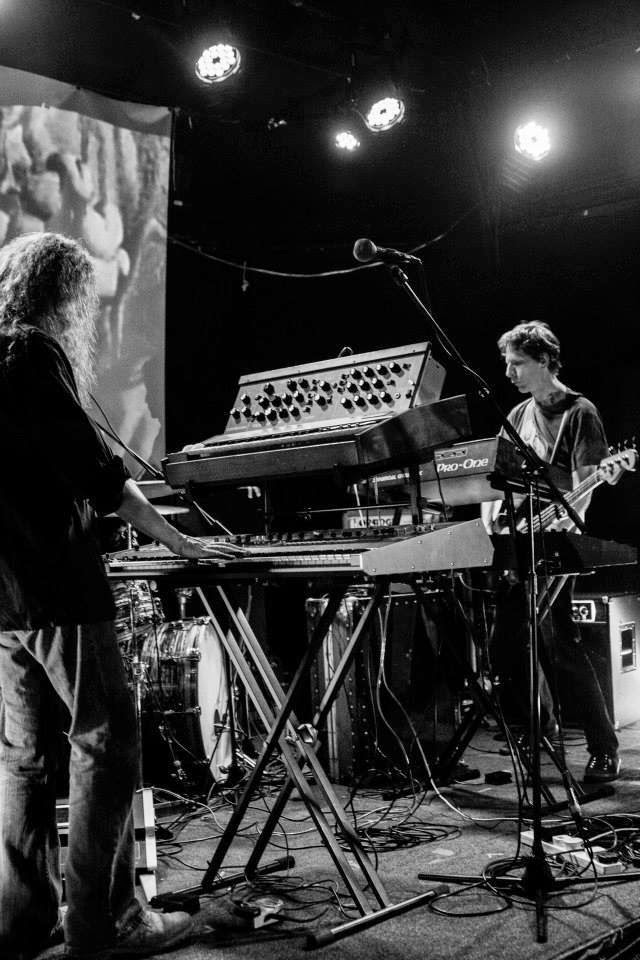
I only recently got introduced to your music, but I was instantly hooked! What’s the current lineup in Zoltan right now? Has this always been the lineup or have there been any changes since you started playing?
The line-up is and has always been :
Matt Thompson – bass, keyboards
Andy Thompson – keyboards
Andrew Prestidge – drums
Plus guitars, tape manipulations, zither or any other instrumentation we see fit to use.
I try to keep up with what everyone is up to musically but even with the internet it’s a daunting task to say the least, plus, nothing beats getting the answers straight from the source anyways! Are any of you involved in any other bands or do you have any side projects going on at this point?
We always have quite a few projects on the go at any one time. We wouldn’t call any of them side projects as such, as Zoltan isn’t really a “main” band anyway. This is the way musicians all seem to work it these days! Andrew co-leads a band called The Osiris Club and he also plays drums in Suns Of The Tundra, Angel Witch and Lucifer. Matt plays in two largely solo projects, Cremator and Rashomon and Andy plays keyboards in Tytan, who are led by Angel Witch’s original bassist, so it all comes full circle.
Have you released any music with anyone else in the past? If so, can you tell us a little bit about that here?
Apart from the bands mentioned above, Andrew has released records as a member of numerous bands including Mint 400, The Oath, Winters and Electric Wizard, Andy played on the first two albums by UK space-rock band Litmus, and Matt released a few albums in a band called Guapo.
How old are you and where are you originally from?
How old is too old? That, anyway. Everyone comes from London, although we now record the keyboards at Andy’s all-analog synth set-up in the bucolic Kent countryside.
What was the local music scene like where you grew up? Did you get very involved in that scene or see a lot of shows or anything? Do you feel like it played a large or important role in forming your musical tastes or shaping the way you perform at this point?
Well, growing up in London we were spoilt for choice, as every touring band would play here. If you’re involved in the music or creative scenes here you can see something interesting pretty much seven days a week, which allowed me to develop my tastes as I got older without having to compromise on availability. The same goes for record shops, bookshops and anything else – it was all here, and the only problem was being able to afford it! I guess there’ve always been scenes of like-minded musicians in London, but I’ve never felt like joining any of them to be honest. I leave scenes for the scenesters.
Was there a lot of music around your home when you were a child? Were either of your parents or any of your close relatives musicians or extremely interested/involved in music?
Our (Andy and Matt’s) dad was a pianist and music teacher, so we had constant pre-20th century classical music playing on the radio at all hours when we were kids. For this reason I now can’t listen to any romantic-era classical, and feel the need to immerse myself in the works of Xenakis, Nono et al as some kind of pointless rebellion against who knows what. Andy broke through the wall some time in the 1970s and from then on it was all hard rock, all the time. Andrew’s dad was a professional drummer in the 1960s who played in Geno Washington’s soul band, so drumming is in his genes I guess.
What would you consider your first real exposure to music to be?
The first record I remember obsessively playing was a double A-side by children’s entertainer Rolf Harris, who strangely enough was convicted of sex crimes against minors last year here in the UK. Apart from that it was regular viewings of UK chart show Top Of The Pops, which were mostly presented by people that were later convicted of sex crimes too; strange country, Britain.
If you were to pick a moment where everything seemed to change for you musically, a moment that opened your eyes to the infinite possibilities that music presents, what would it be?
It would be either seeing Hawkwind at age thirteen, or seeing the Butthole Surfers age nineteen, which was like a bad acid version of the Hawkwind show. Who needs drugs?
When did you decide that you wanted to start writing and performing your own music? What brought that decision about for you, or was it more of a natural extension of being given an outlet to create something and express yourself?
Black Sabbath miming to “Never Say Die” on Top Of The Pops, 1978. Since then it’s been a long, hard thirty five years trying to reach that level of awesomeness.
What was your first instrument? When and how did you get that?
Some crappy bass or other, on which I played along with the records of “In-A-Gadda-Da-Vida” and “Sunshine Of Your Love” a lot.
How did the members of Zoltan meet? When would that have been?
Matt and Andy, being brothers, met over the breakfast table most days when growing up. Andrew we knew through shared rehearsal spaces, sometime in the mid-2000s, I guess.
When did the band form and what led to the formation of Zoltan?
We formed in 2010 as an offshoot of The Osiris Club in its original incarnation. We wanted to be in a rock band that didn’t rely on guitars or vocals to get the point across, but without compromising on intensity. Leaving that space in the sound means you have to work extra hard at creating an atmosphere, so we wanted to push ourselves to try something we hadn’t really done before.
Is there any sort of shared creed, code, ideal or mantra that the band shares or lives by?
“Fuck digital synths”.
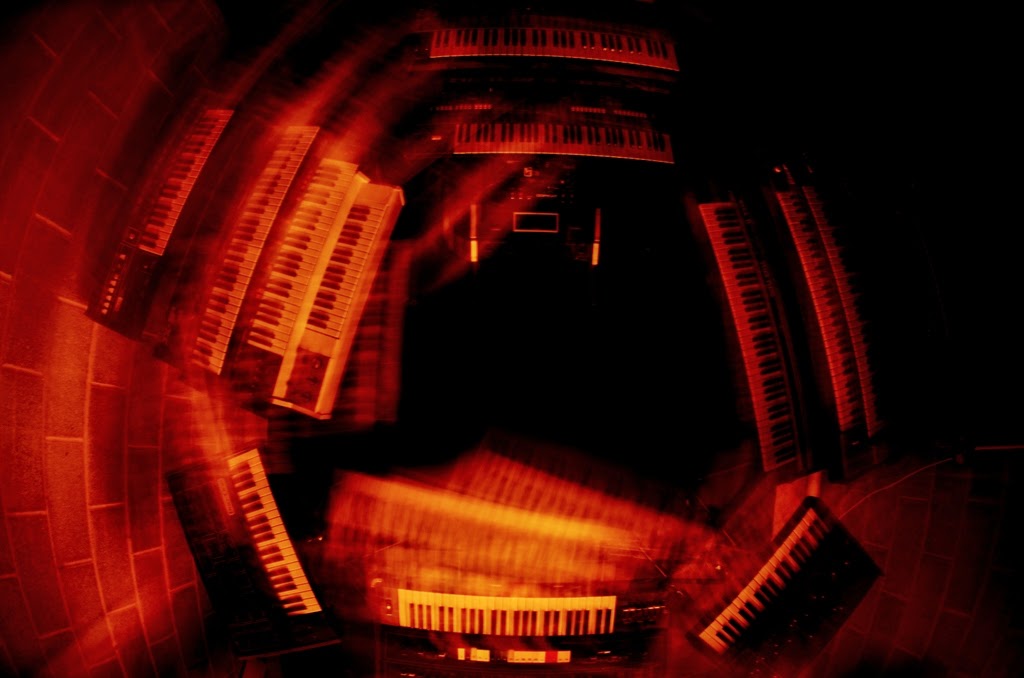
What does the name Zoltan mean or refer to in the context of your band name? The name Zoltan pops up quite a bit despite the fact I felt like I’d never heard of it before. Zoltan Istvan who’s a philosopher, columnist and all around gonzo dude and Zoltan Mackay who’s a psych rocker from Glasgow both instantly leap to mind, but I’m prone to over-thinking things to say the least… Who came up with it and how did you all go about choosing it? Are there any close runners up you almost went with you can recall at this point?
We’re actually named after the execrable 1970s horror film Zoltan: Hound Of Dracula, which I was terrified by as a child. No idea why, it’s about as scary as Scooby Doo.
Where’s Zoltan located at right now? How would you describe the local music scene where you’re at?
Still located somewhere between London and Kent. No idea about the current music scene really, we just exist in a vacuum of our own devising.
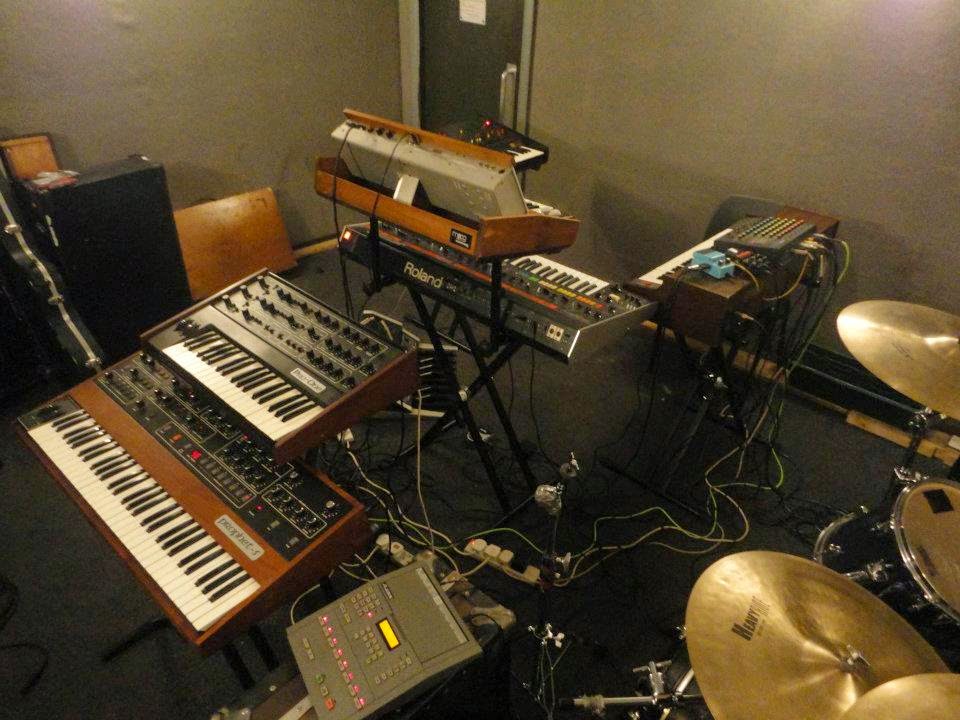
Are you very involved in the local scene in your opinion? Do you book or attend a lot of shows or anything?
Less so these days…
Has the local scene played an integral role in the sound, history or evolution of Zoltan in your opinion or do you feel like you all would be doing and sound like you do regardless of where you were at?
No, we’re the sum of our record collections rather than being bothered by what “the scene” may think.
Are you involved in recording or releasing any music besides your own? If so, can you tell us a little bit about that here briefly?
We all play in other bands (see question two above), but apart from that not really.
Whenever I do these interviews I inevitably have to describe how a band sounds to a bunch of our readers who’ve never heard of them before. I only talk to bands that I really dig so it can be a daunting task to say the very least, it keeps me up late and night and I swear I think it’s leading to an ulcer or something… Rather than feeding this growing neurosis, how would you describe Zoltan to our readers who might not have ever heard you all before?
The Terminator’s bad dream.
You guys have a sound that I’m not sure I’ve ever heard anywhere else before. I mean, yes I’ve heard horror-influenced stuff, Carpenter tribute stuff, prog rock, basically you name it, and I can pick it out in your music, but I’ve never heard it all convalesce and combine like it does in your sound. There’s a little bit of something for everyone going on in the dense forest of sound and the more you listen the more you’re able to pick out. Who would you cite as your major musical influences? What about influences on the band as a whole rather than just individually?
Strangely enough we’re not obsessed with Goblin, Fabio Frizzi etcetera. We just seem to have fallen into that genre; it’s probably time to change the sound a bit actually. Major influences for me include the Holy Trinity of soundtrack composers. That’s Ennio Morricone, Bernard Herrmann and Toru Takemitsu, plus all sorts of other stuff, gamelan, prog, electro-acoustic composition, krautrock, free improv, MOR, J-pop, 70s metal, folk-rock, probably more I could think of. Kind of difficult to say what’s an influence and what isn’t, I suppose it all is! For the band as a whole, we can all agree that we like Rush. Different eras though…
What’s the songwriting process like for Zoltan? Is there one of you that usually comes to the rest of the guys with an idea for a song that’s pretty well worked out, and then finish that up with the rest of the band? Or do you all get together and kind of toss ideas back and forth, mulling stuff over until you’ve worked out something that you’re interested in working on and refining?
We tend to work from the rhythm upwards, jamming out some bass/drum ideas then working them round melodic ideas. Then, we add arrangements and sometimes even main themes during the recording and editing process. It’s all a bit convoluted actually, but that’s how bands often work these days I’ve noticed. You just kind of bodge it together over a period of time, then pretend it’s a coherent artistic statement even though it isn’t. No one suspects a thing!
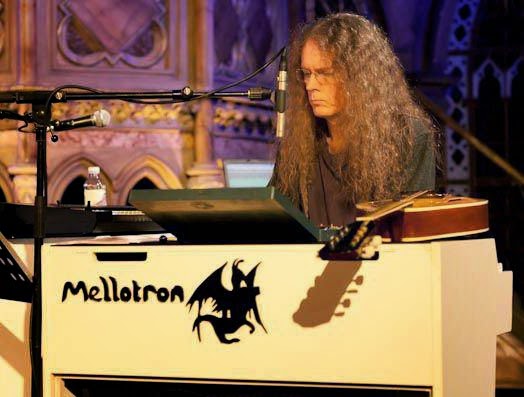
What about recording? I’m a musician myself, or at least I’d like to fancy myself one, and while I think that most musicians can appreciate the end result of all the time and effort that goes into making an album when they’re finally holding that finished product in their hands, getting to that point can be extremely hard to say the least. Recording and getting things to sound the way you want them to as a band, and even down to small things like getting the music mixed and mastered properly can be hair pulling propositions to some people. What’s it like recording for Zoltan?
We’ll record the drums properly in a studio, then after that it’s quite intense sessions of layering the keyboards on, a lot of which involves programming and tweaking the sounds. Not much rock n’ roll going on really. Mixing and mastering is easier for us than for a lot of other bands as we’re not dealing with guitars or vocals, and the keyboards just mix themselves pretty much. Experience has told us that we have to hone it down to the point where we say “it’s finished”, without feeling like we need to eternally tweak and fuss over inaudible details too.
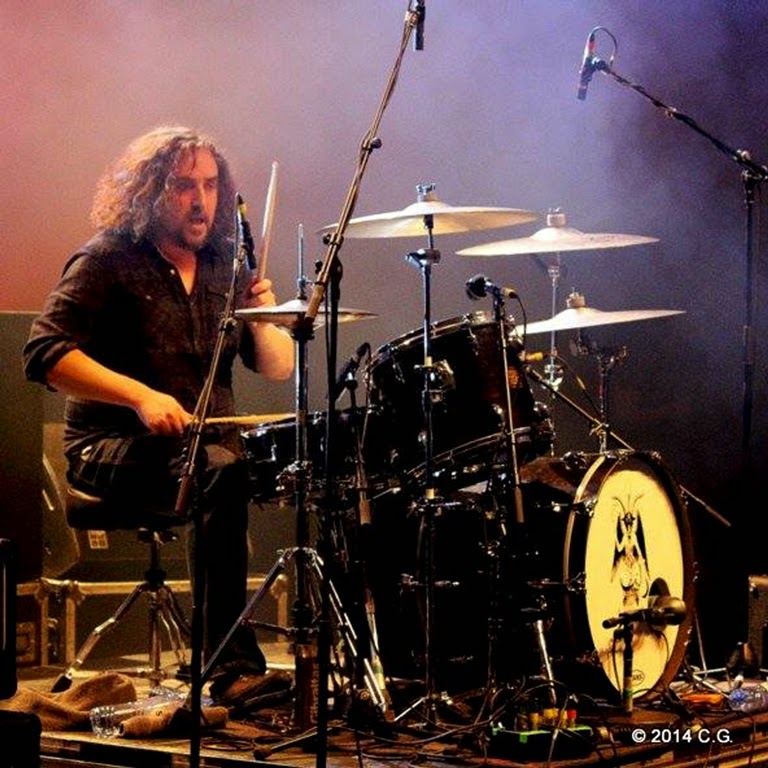
Do you all like to take a DIY approach to recording where you handle most of the technical aspects of things on your own so you don’t have to work with or compromise on the sound with anyone else, or do you head into a studio and let someone else handle that headache so you can concentrate on the music and getting things to sound just the way you want them to?
The drums are really the only “live” aspect of the sound, well the bass too, but that’s easy to record. So we can spend as long as we want recording at home without worrying about a ticking clock or going over budget, which works well as there’s no budget anyway.
Is there a lot of time and effort that goes into working out every little part of a song’s composition and arrangement before it’s recorded, or do you all like to get a good idea of what a song’s going to sound like and then let it evolve and change a bit during the recording process while things are happening and you can hear them coming together and unfolding?
Trying to work out a song to the last note before recording is a fool’s errand in my opinion. It’ll always change, and you have to be flexible in your approach otherwise you’ll end up with a dog’s dinner of a finished product. And who wants to eat dog food?
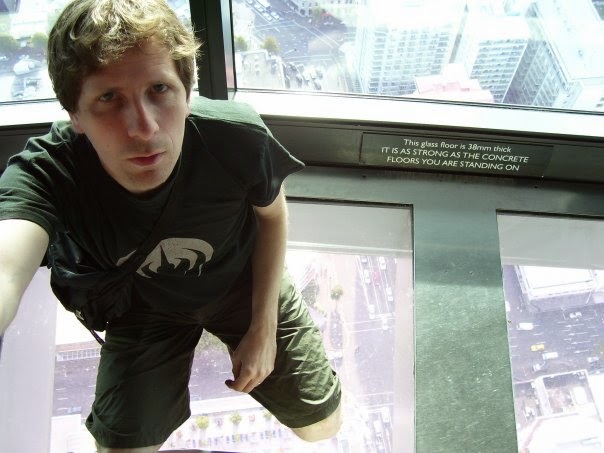
Do psychoactive or hallucinogenic drugs play a large or important role in the songwriting, recording or performance processes for Zoltan at all? I don’t mean this in any sort of crass or demeaning manner, people have been tapping into the altered states that drugs produce for thousands of years to create art and I’m simply always curious about their usage and application when it comes to the art that I personally enjoy and consume on a daily basis.
Never done any drugs in my life, which is probably why we don’t sound like Ozric Tentacles or The Grateful Dead. We’re more a cup of tea band.
Speaking of recording, let’s talk a little bit about your back catalog for a moment. Your first release that I know of was ‘First Stage Zoltan’ in 2012 for the ever amazing Austrian Cineploit label on CD and LP. Can you tell us a little bit about the recording of the material for ‘First Stage Zoltan’? Was that a fun, pleasurable experience for you all? When and where was that recorded at? Who recorded it? What kind of equipment was used for ‘First Stage Zoltan’?
That album was our first experience of recording and mixing ourselves, apart from the drums, which were done in a professional studio, and those songs are also the first songs we ever wrote. So it was a voyage of discovery, with many missteps and fuck-ups along the way. In retrospect it probably sounds okay considering it was made for less than £1000.
For those who are interested, here is a list of the keyboards we use on all our records:
Mellotron
Hammond B-3 organ
Fender Rhodes piano
Wurlitzer piano
Hohner Clavinet
Roland Jupiter 8
SCI Prophet 5
Roland JX3P
Solina string synth
Logan string synth
Roland Juno 6
Yamaha CS50
MiniMoog
Moog Taurus bass pedals
Moog Rogue
SCI Pro One
ARP Odyssey
ARP Pro-DGX
Roland SH-09
Roland SH-1000
Korg MiniKorg
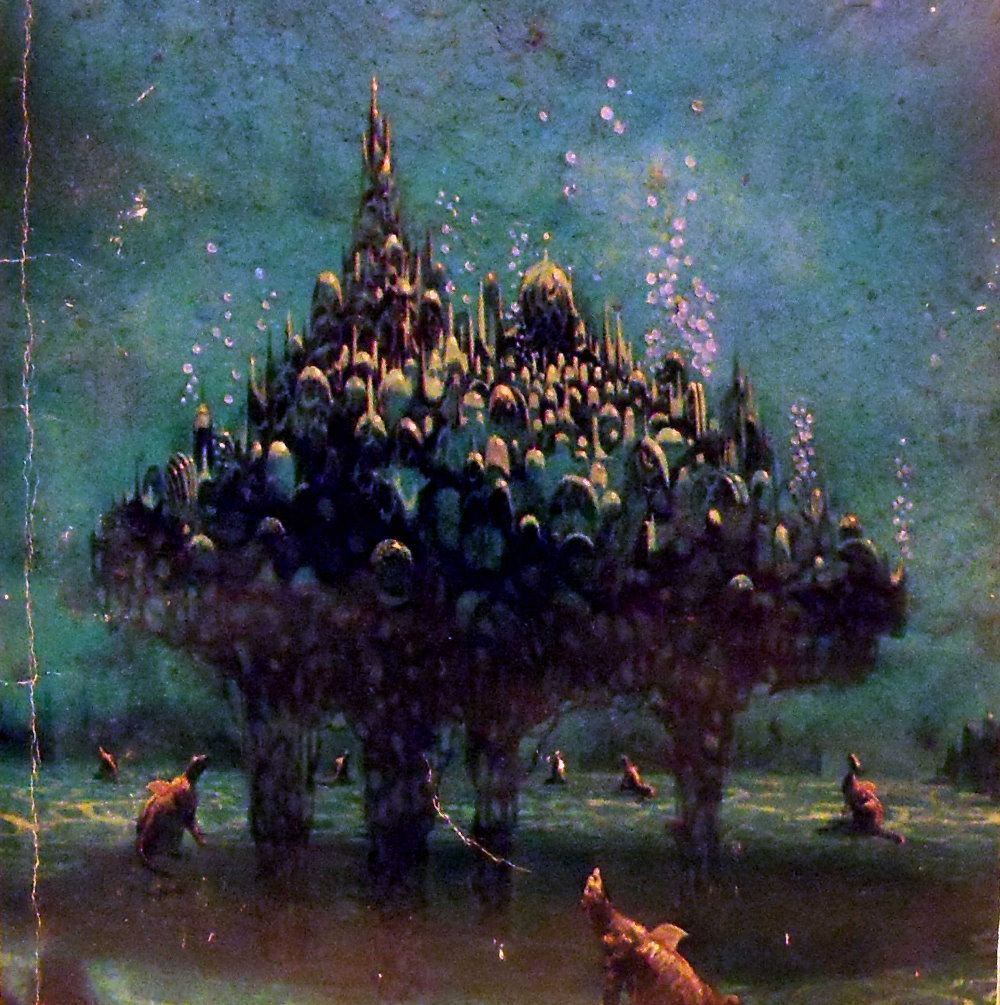
You followed up 2012’s ‘First Stage Zoltan’ with the ‘Psychomania’ 12” again for Cineploit, but this time exclusively on vinyl; although an extremely limited CD version was later released with your latest album ‘Sixty Minute Zoom’ in an edition of only 50 copies. One side of the album features your tribute to John Cameron’s score for the Don Sharp film from which you took the album ‘Psychomania’ and the other side, locked grooves from the film itself. Obviously you all are extremely rooted in the horror soundtracks of the 70s and 80s, but what brought about reworking themes from ‘Psychomania’?
That was an idea I’d had on the back burner for at least a decade, as the film was shown on late-night UK TV at least once a year through the 1980s and it had kind of seeped into me. Listening to the soundtrack album that came out on Trunk Records carefully, the soundtrack really was shoddily recorded and played by session musicians who I suspect weren’t really rooted in funk. In tribute, we made sure it sounded authentically ragged and lo-fi.
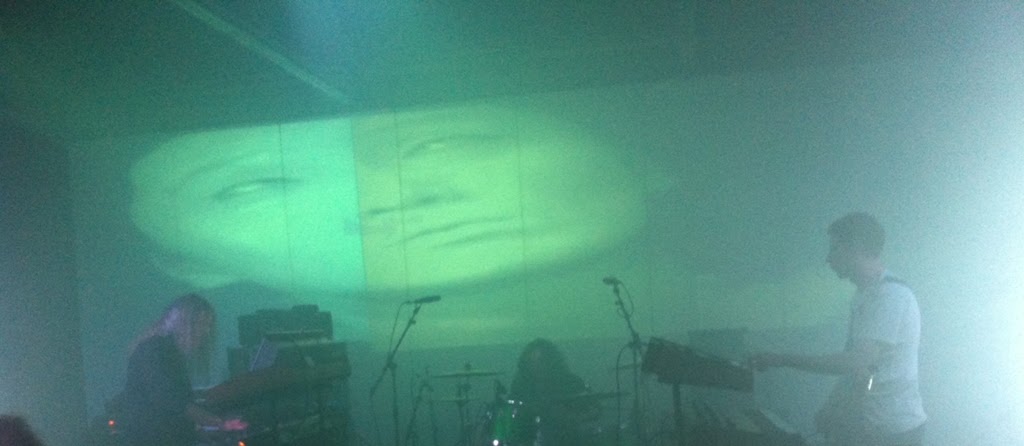
What was the recording of ‘Psychomania’ like? Was the recording of the material for ‘Psychomania’ very different than the sessions for ‘First Stage Zoltan’? When was the ‘Psychomania’ material recorded? Where was that recorded at? What kind of equipment was used this time around?
We used less polysynths on this EP in order to make it sound authentically ancient and creaky. We also played in a bit of psaltery to take it even further back to the medieval era. No one seemed to find the B-side locked grooves as funny as we did, but we don’t care! We originally wanted about twenty, but those things are horribly expensive to put on a record, so we had to compromise on our “vision”.
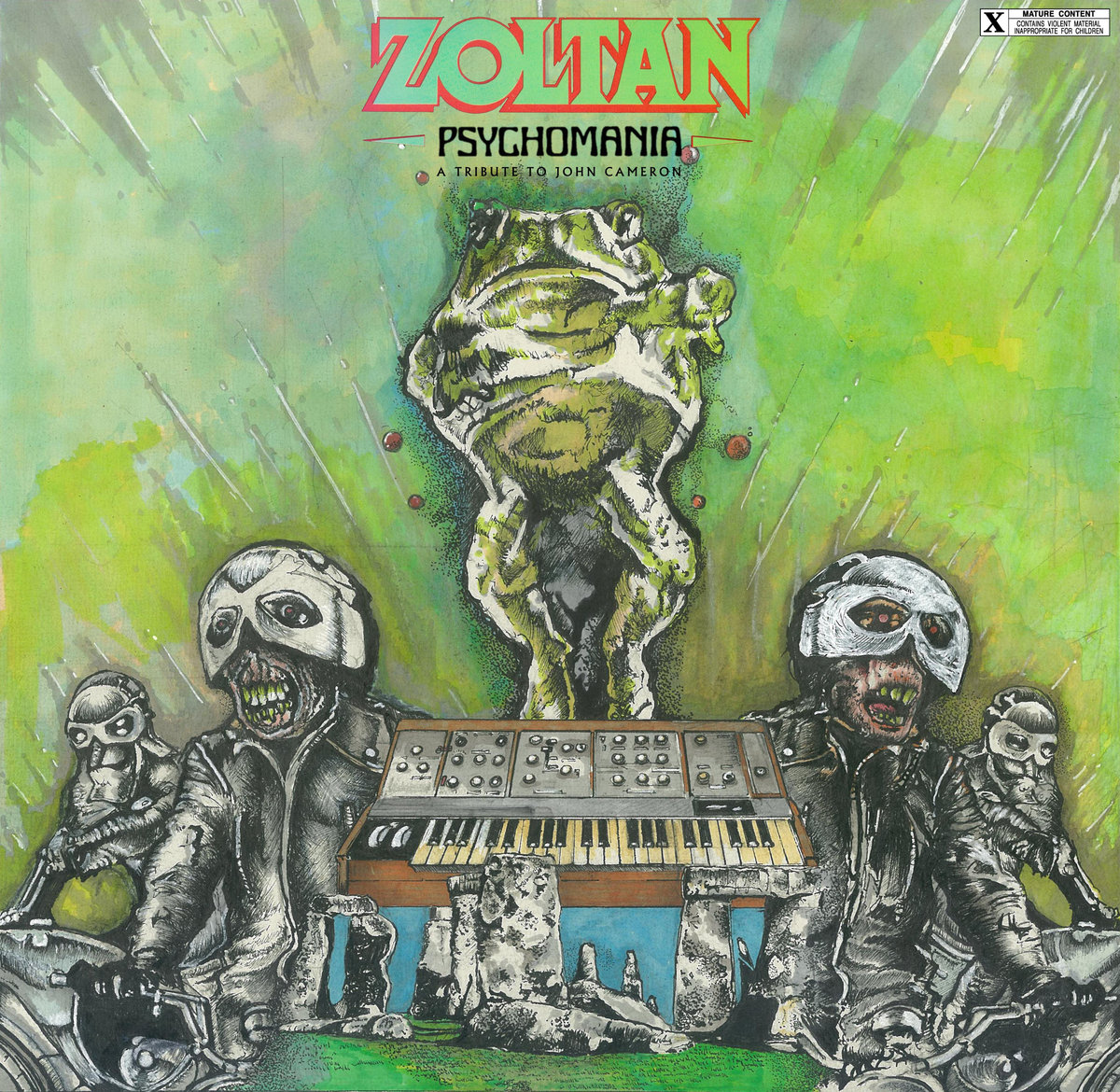
You had two releases this year in 2014. The first of which was ‘Tombs Of The Blind Dead’ which is another tribute piece, this time paying homage to Anton Garcia Abril’s score for Amando de Ossorio’s amazing Blind Dead tetralogy, one song for each film. How did a tribute to the Blind Dead come about? What was the recording of the material for ‘Tombs Of The Blind Dead’ like? When and where was that material recorded? Who recorded it? What kind of equipment was used?
Lee from Rise Above wanted us to record it, as there is no soundtrack album of the original score available and this seemed the best way for people to hear it. The recording this time involved a lot more tape manipulation than before, which was all played off a Tascam 4-track for lo-fi authenticity, again. The material was a lot free-er and less arranged than anything we’d done before, which gave us the freedom to mess with it and do whatever we wanted without having to stick to an arrangement. We were more interested in capturing the creepy atmosphere of the films than recreating the soundtrack I suppose.
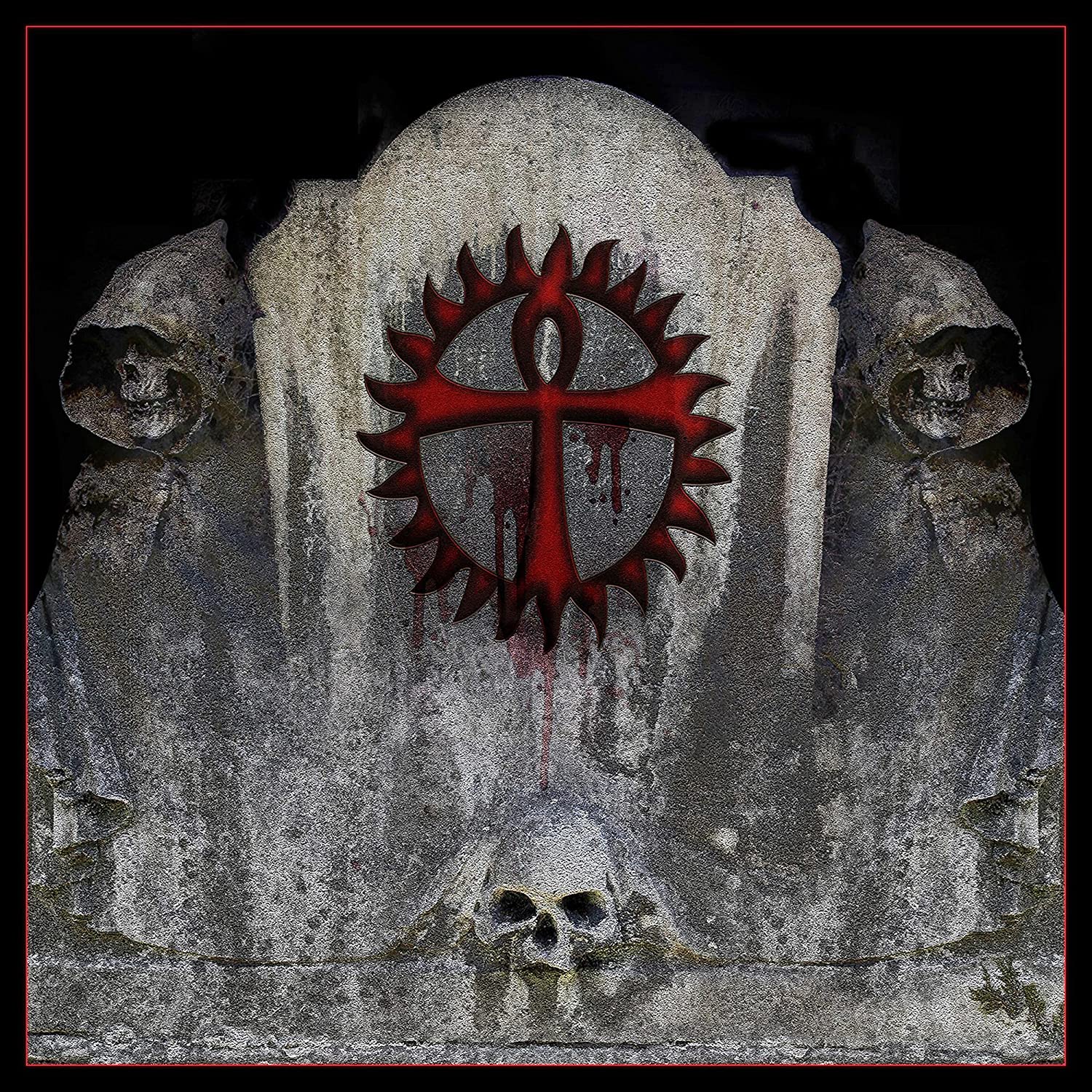
With ‘Psychomania’ and ‘Tombs Of The Blind Dead’ both paying homage to early horror film scores, are there any plans of making this a kind of ongoing series of releases? Or did it just work out that you had both of these projects in mind and they happened to come to fruition?
We have a couple more short recordings of film score adaptations knocking around that may or may not see the light of day at some point, but apart from that we’ll be concentrating on our own material from now on.
You also released your sophomore full-length album ‘Sixty Minute Zoom’ for Cinepolit in 2014 as well. It was an amazing follow up to not only the mini-albums but your debut as well. Did you all try anything radically new or different when it came to the songwriting or recording of the material for ‘Sixty Minute Zoom’? Who recorded it and where was that at? When would that have been and what kind of equipment was used this time around?
The songwriting this time round was a bit more fractured than before. In fact, I’m not sure if we were ever all in the same room at the same time during the whole recording process, which is something we’ll be changing in future. Side two of the album is a twenty-minute suite called “The Integral”, which we based on a 1921 Russian science fiction novel by Yevgeny Zamyatin called We. We actually kept the atmosphere of the book in mind as we were writing and recording it, so that was the first time we wrote a proper conceptual piece of music with a definite theme.
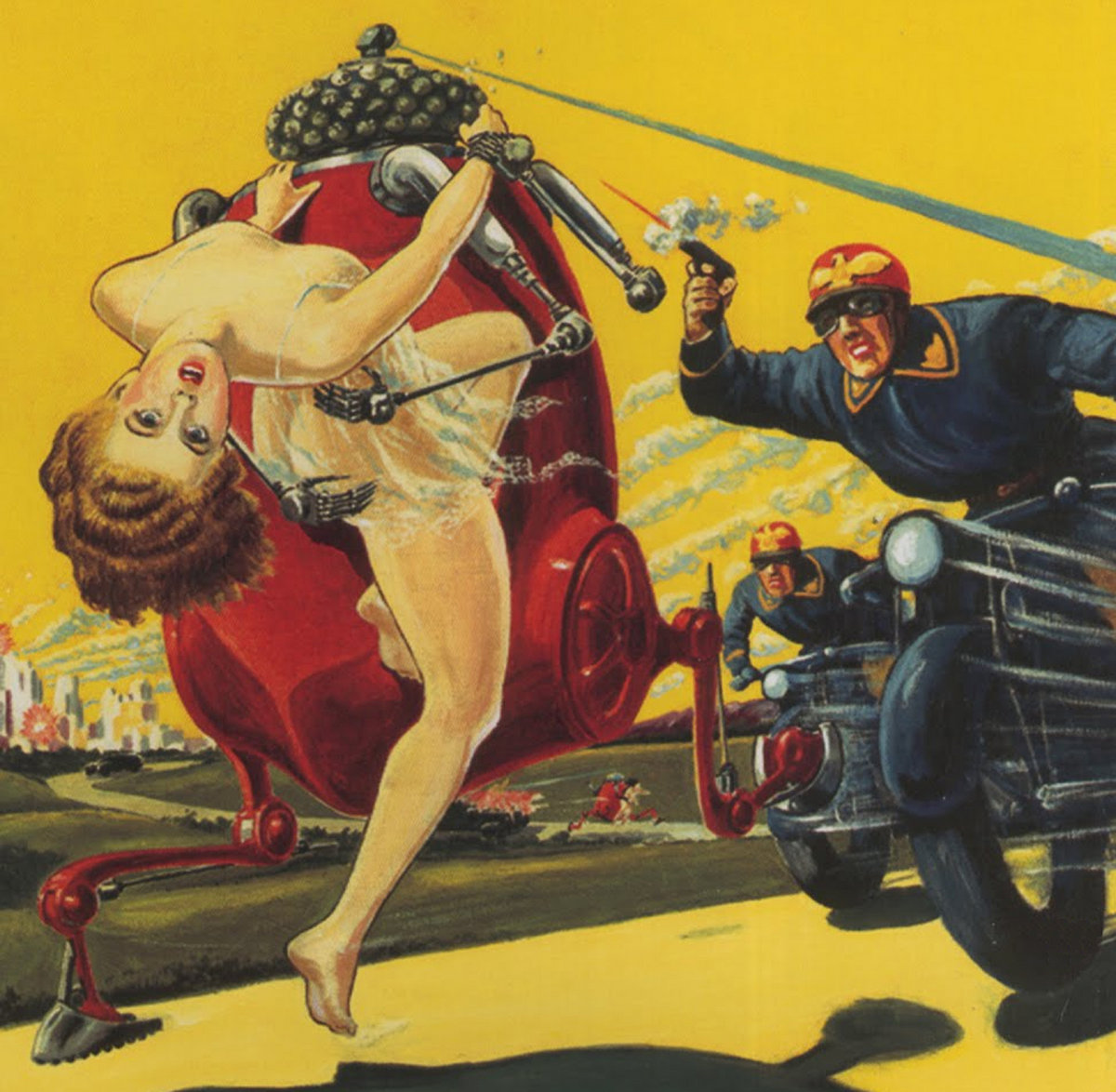
Does Zoltan have any music that we haven’t talked about yet, maybe a demo or a single that I don’t know about?
No, apart from the afore-mentioned film-score adaptations we haven’t released yet.
With the frantic release pattern that you’ve established in the past couple of years I don’t hesitate to ask, are there any other releases in the works or on the horizon at this point for Zoltan that you can talk about?
We’ll be working on music for a third album some time this year or next year, but there’s no deadline for it at the moment. Probably time to change the style a bit!
I try and provide our readers with as many possible options for picking up music as I can. Where’s the best place for our US readers to pick up your stuff? With the completely insane international shipping rates it’s nice to have all the options you can when picking up imports so you can combine stuff and hopefully save a few dollars on shipping, as-if!
The Cineploit records are all stocked at Dusty Groove, plus you can find a complete list of Cineploit distributors at their website.
The New Year is right around the corner as I write this, are there any major plans or goals that Zoltan would like to accomplish in 2015?
We may try to move into live film-scoring this year, we’ll see if it happens! We’d love to work on actual soundtracks too, which could just be wishful thinking, but fingers crossed. They might reboot Zoltan: Hound Of Dracula and need a prog-synth soundtrack for it.
What, if anything, do you all have planned as far as touring goes right now?
We have a show lined up at the Roadburn festival in Holland this April. Nothing confirmed apart from that right now. Festivals are always good to play as you’re pretty much guaranteed an audience; famous last words there maybe.
Do you all spend a lot of time out on the road touring? What’s it like out on the road for Zoltan? Do you enjoy touring?
Not really, the gigs we have done mostly involve lumping back-breaking keyboard flightcases up and down stairwells to be honest.
Who are some of your personal favorite bands that you’ve had a chance to play with over the past few years?
We haven’t played that many gigs, but Astra on Rise Above Records and Thelema who are also on Cineploit spring to mind.
What was the first song that Zoltan ever played live? When and where would that have been at?
Our first gig was in 2012 at a club called the Black Heart in Camden, north London, where we have played many times since. No idea what song we played first! It was probably five minutes of keyboard tuning actually.
Do you all give a lot of thought to the visual aspects that represent the band to a large extent? Stuff like flyers, posters, shirt designs, cover artwork and that kind of thing? Is there any kind of meaning or message that you’re attempting to get across or convey?
We try and match the artwork to the mood of the music for sure. So far, we’ve used a mix of found vintage sci-fi illustrations and original artwork drawn by our drummer Andrew, who is an accomplished illustrator as well as a musician. “Melancholy retro-futurism” is probably the best description of what we’re trying to get across with the whole package, both visual and musical. Our ‘Tombs Of The Blind Dead’ EP on Rise Above also featured artwork by our friend Julia Harris at Nuovo Creative, as we felt she could bring out the brooding darkness of the soundtrack better than we could.
Is there anyone that you usually turn to in your times of need when it comes to the visual side of Zoltan? If so, who is that and how did you originally get hooked up with them?
We’ve known Julia for years, and apart from that we do it all in-house. We have ambitions for a more involved stage production at some point, so we’ll be looking for someone to collaborate with on that when the time comes.
With all of the various methods of release that are available to musicians today I’m always curious why they choose and prefer the various mediums that they do. Do you have a preferred medium of release for your own music? What about when you’re listening to or purchasing music? If you do have a preference, what is it and can you tell us a little bit about why that is?
Personally I’m not too bothered about the medium – these days, a lot of people just buy digital downloads anyway. With the physical releases, we tend to release on vinyl as it’s popular at the moment and the artwork looks better. I dream of the day when we can just download the music into people’s bloodstreams or whatever and fuck with their DNA. I give it twenty five years before this is possible.
I grew up around my dad’s enormous collection of music and he was always encouraging me to listen to anything that I wanted, but taking me to the local shops and picking me up random releases is what left the biggest impression on me! I remember, I would rush home, grab a set of headphones, read the liner notes over and over, and stare at the cover artwork while I listened to the music just letting the experience carry me off on this trip. Having something physical to hold in my hands, something to experience along with what I was hearing has always made for a much more complete listening experience for me and has led to somewhat of an addiction over the years looking for that next big rush, finding that great hidden album! Do you have any such connection with physically release music?
I grew up listening to prog rock and heavy metal, so the artwork was always a big thing. We all have large record collections still, but you get to the point where you realize you’re discovering new music mostly via YouTube, and listening mostly to MP3s. So the physical artifact is withering away over the years, which can only be good news for landfill sites.
Like it or not at this point, digital music is here in a big way. I don’t personally thing that it’s really any better or worse than it was, and that really its how you look at things. I mean, on one hand, people are being exposed to the literal world of music that they’re surrounded by for the first time in history. It’s helped them listen to and discover music from all over the world as well as their back yards and hometowns, eliminating geographic boundaries that would have ensured no one would ever have heard of them even a few short years ago. On the other hand though, while people are being exposed to all this amazing new music they’re not necessarily interested in paying for it at this point. People’s interaction and relationship with music is constantly evolving but it seems like music is becoming a disposable experience to a lot of people, a “free” soundtrack to their life that they just expect to be there forever with out giving much thought to the people making it or how they’re making ends meet. I don’t think that anyone was getting rich from independent record sales or anything, but internet piracy has definitely impacted the bottom line for a lot of labels and artists. As an artist during the reign of the digital era, what’s your opinion on digital music and distribution?
The internet in general has broken down geographical boundaries for bands. Living in the middle of nowhere isn’t necessarily a problem for releasing music and promoting yourself like it used to be. As far as digital sales go, I’m sure it’s impacted artists who were breaking even or making a modest living from it before the most. On the other hand people seem happier to spend their music budget on inflated ticket prices rather than actual music, so it probably balances out for heritage acts or bands with a reasonable following. For the rest of us it’s not like anyone ever made money off record sales anyway…
I try to keep up with as many good bands as I possibly can, but with all of the amazing stuff out there right now it’s hard to even know where to start sometimes. Is there anyone from your local scene or area that I should be listening to I might not have heard of before?
Our “local area” is now the whole world going by my previous answer, so I’ll recommend Khun Narin’s Electric Phin Band from Thailand.
What about nationally and internationally?
Moving off the planet, there is a very good audio representation of the Big Bang here:
“Using data from a Nasa probe that records differences in temperature between different areas of the sky, John Cramer, professor of physics at the University of Washington in Seattle, was able to calculate the frequencies of the sound waves that radiated through the universe during its first 760,000 years, according to New Scientist magazine. The professor had to scale the frequencies billions of times to make them audible – the frequency of sound waves at that time being too low to be heard.”
Thanks so much for taking the time to talk to me about the band. I’ve been extremely curious about you all since the first time I heard you and it was awesome getting such an in-depth look at your history and the creative process for the band. Since you were so generous with your time I’d like to take this opportunity to open the floor up to you for a moment. Is there anything that you might want to take this opportunity to talk to me or the readers about at this point?
I think I’ve said too much already.
Roman Rathert
DISCOGRAPHY
(2012) Zoltan – ‘First Stage Zoltan’ – Digital, CD, 12” – Cineploit (CD limited to 250 copies, 12” limited to 250 copies, 12”+CD limited to 250 copies)
(2013) Zoltan – ‘Psychomania’ – Digital, 12” – Cineploit (Limited to 350 copies)
(2014) Zoltan – ‘Tombs Of The Blind Dead’ – Digital, 12” – Rise Above Records (Crystal Clear Wax Vinyl limited to 100 copies, Solid Purple Wax Vinyl limited to ? copies, Solid Red and Black Mixed Wax Vinyl limited to ? copies)
(2014) Zoltan – ‘Sixty Minute Zoom’ – Digital, CD, 12” – Cineploit (12” limited to 200 copies, Mint Pack CD limited to 500 copies, 12”+CD limited to 250 copies, 12”+2CD set including ‘Psychomania’ on CD limited to 50 copies)

